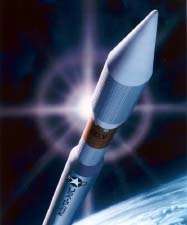Alleged Result of Theft: Boeing Got Most EELV Launches From
DOD
 Two fired Boeing employees
have been indicted on charges they won a major DOD contract by
stealing documents from arch-rival Lockheed-Martin. The grand jury
returned the criminal indictment against former Boeing managers
Kenneth Branch, 64, and William Erskine, 43, for the misuse of
proprietary Lockheed Martin Co. documents during bidding for Air
Force launch contracts.
Two fired Boeing employees
have been indicted on charges they won a major DOD contract by
stealing documents from arch-rival Lockheed-Martin. The grand jury
returned the criminal indictment against former Boeing managers
Kenneth Branch, 64, and William Erskine, 43, for the misuse of
proprietary Lockheed Martin Co. documents during bidding for Air
Force launch contracts.
The two, who were managers in the Evolved Expendable Launch
Vehicle (EELV) program, were charged with conspiracy to conceal and
possess trade secrets by a federal grand jury in Los Angeles. If
convicted, both men face a maximum of 10 years confinement and a
fine of $250,000, or both.
 Branch's attorney, Richard M.
Steingard, said in a prepared statement after the indictments were
handed down, "Although Mr. Branch and I are deeply disappointed
that the government has decided to charge even one count of
criminal misconduct, we have no intention of litigating the case in
the media and will only address the allegations in court."
Branch's attorney, Richard M.
Steingard, said in a prepared statement after the indictments were
handed down, "Although Mr. Branch and I are deeply disappointed
that the government has decided to charge even one count of
criminal misconduct, we have no intention of litigating the case in
the media and will only address the allegations in court."
"The potential theft of proprietary data is a specter that can
strike at the very foundation of any competitive system designed to
ensure quality while containing costs," said Joseph E. Schmitz,
Department of Defense inspector general. "Competitions to design
and build the most advanced military systems in the world for the
Department of Defense have a potential value of billions of dollars
per year. Part of the mission of the DCIS special agents is to
investigate allegations to ensure that the integrity of commercial
competitions are strictly maintained and that a fair playing field
is maintained among defense contractors."
In 1997, the Air Force announced contracts for EELV services to
both Boeing and Lockheed Martin. The Air Force agreed to provide
each company with $500 million for development costs associated
with their respective EELV programs, with both companies agreeing
to pay any additional developmental costs.
In 1998, of the 28 initial EELV launches, Boeing won 19 of the
launches while Lockheed won nine. The EELV program uses the
Lockheed Atlas or the Boeing Delta rocket systems to launch
government satellites into space for national security interests as
well as for the transportation of commercial satellites.

In 2002, upon learning about the loss of proprietary documents,
Lockheed Martin alerted the Air Force, which, in turn, informed the
DCIS. DCIS and OSI then launched an investigation into the theft
and referred the case to US Attorney Debra W. Yang for the Central
District of California.
Boeing: Clean So Far
To this point, there's no indication that Boeing itself will
face federal charges, but the case is still relatively young. After
both Erskine and Branch were fired, they filed wrongful termination
suits againgst the company. A federal court last year dismissed
both cases.
Boeing even took the extraordinary step of placing full-page ads
in major newspapers, apologizing for the conduct of its employees,
but reaffirming CEO Phil Condit's believe that Boeing itself is
clean.
But even if Boeing survives the criminal inquiry relatively
unscathed, it's not out of the legal woods yet. Lockheed filed a
federal lawsuit last month against Boeing, the two managers and
another former employee.
 Aero-News: Quote of the Day (12.07.25)
Aero-News: Quote of the Day (12.07.25) ANN's Daily Aero-Linx (12.07.25)
ANN's Daily Aero-Linx (12.07.25) NTSB Final Report: Lafferty Jack Sea Rey
NTSB Final Report: Lafferty Jack Sea Rey Classic Aero-TV: The B29 SuperFortress Doc - History in Flight
Classic Aero-TV: The B29 SuperFortress Doc - History in Flight Airborne 12.08.25: Samaritans Purse Hijack, FAA Med Relief, China Rocket Fail
Airborne 12.08.25: Samaritans Purse Hijack, FAA Med Relief, China Rocket Fail





